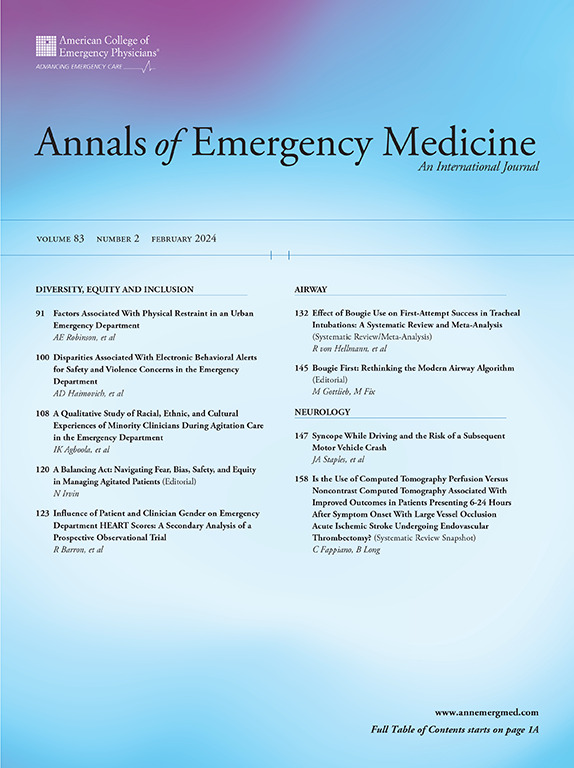Managing Clinical Uncertainty: Formalizing Management Reasoning in Emergency Care Delivery.
IF 5
1区 医学
Q1 EMERGENCY MEDICINE
引用次数: 0
Abstract
Emergency care faces a persistent tension between the imperative for diagnostic accuracy and the complex social, environmental, resource, and time constraints inherent to clinical practice. Classical diagnostic reasoning, typically portrayed as convergent, binary, and occurring in serial, linear steps, often conflicts with the necessary pragmatism of emergency department care where clinicians routinely act under conditions of uncertainty. This article argues that diagnostic reasoning occurs in parallel to the broader and less explored framework of management reasoning. We contrast management reasoning as a multidimensional, context-sensitive process wherein clinical decisions-ranging from test ordering and therapeutic interventions to patient disposition-are continuously shaped by evolving information, patient preferences, clinician judgment, and system constraints. Although interrelated, diagnostic and management reasoning represent complementary cognitive processes, each with its own objectives, methods, and measures of quality. In this piece, we argue that management reasoning is both a teachable and assessable skill and should be systematically formalized into clinical care, research, and education to support high-quality, safe, patient-centered emergency care.管理临床不确定性:在紧急护理提供规范化管理推理。
急诊护理面临着诊断准确性与临床实践中复杂的社会、环境、资源和时间限制之间持续的紧张关系。经典的诊断推理,通常被描述为收敛的、二元的,并在连续的、线性的步骤中发生,经常与急诊科护理的必要实用主义相冲突,在急诊科,临床医生通常在不确定的条件下行事。本文认为,诊断推理与更广泛和较少探索的管理推理框架并行发生。我们对比了管理推理作为一个多维的,上下文敏感的过程,其中临床决策-从测试顺序和治疗干预到患者的处置-不断受到不断变化的信息,患者偏好,临床医生判断和系统约束的影响。尽管相互关联,诊断推理和管理推理代表互补的认知过程,每一个都有自己的目标、方法和质量度量。在这篇文章中,我们认为管理推理既是一种可教的和可评估的技能,应该系统地形式化到临床护理、研究和教育中,以支持高质量、安全、以患者为中心的急诊护理。
本文章由计算机程序翻译,如有差异,请以英文原文为准。
求助全文
约1分钟内获得全文
求助全文
来源期刊

Annals of emergency medicine
医学-急救医学
CiteScore
8.30
自引率
4.80%
发文量
819
审稿时长
20 days
期刊介绍:
Annals of Emergency Medicine, the official journal of the American College of Emergency Physicians, is an international, peer-reviewed journal dedicated to improving the quality of care by publishing the highest quality science for emergency medicine and related medical specialties. Annals publishes original research, clinical reports, opinion, and educational information related to the practice, teaching, and research of emergency medicine. In addition to general emergency medicine topics, Annals regularly publishes articles on out-of-hospital emergency medical services, pediatric emergency medicine, injury and disease prevention, health policy and ethics, disaster management, toxicology, and related topics.
 求助内容:
求助内容: 应助结果提醒方式:
应助结果提醒方式:


